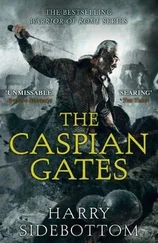Harry Sidebottom - The Wolves of the North
Здесь есть возможность читать онлайн «Harry Sidebottom - The Wolves of the North» весь текст электронной книги совершенно бесплатно (целиком полную версию без сокращений). В некоторых случаях можно слушать аудио, скачать через торрент в формате fb2 и присутствует краткое содержание. Жанр: Исторические приключения, на английском языке. Описание произведения, (предисловие) а так же отзывы посетителей доступны на портале библиотеки ЛибКат.
- Название:The Wolves of the North
- Автор:
- Жанр:
- Год:неизвестен
- ISBN:нет данных
- Рейтинг книги:3 / 5. Голосов: 1
-
Избранное:Добавить в избранное
- Отзывы:
-
Ваша оценка:
- 60
- 1
- 2
- 3
- 4
- 5
The Wolves of the North: краткое содержание, описание и аннотация
Предлагаем к чтению аннотацию, описание, краткое содержание или предисловие (зависит от того, что написал сам автор книги «The Wolves of the North»). Если вы не нашли необходимую информацию о книге — напишите в комментариях, мы постараемся отыскать её.
The Wolves of the North — читать онлайн бесплатно полную книгу (весь текст) целиком
Ниже представлен текст книги, разбитый по страницам. Система сохранения места последней прочитанной страницы, позволяет с удобством читать онлайн бесплатно книгу «The Wolves of the North», без необходимости каждый раз заново искать на чём Вы остановились. Поставьте закладку, и сможете в любой момент перейти на страницу, на которой закончили чтение.
Интервал:
Закладка:
Afterwards, the killer wended an obscure, unfrequented way down to the riverbank. It was dusk. The ducks were flighting. Taking out the gilded ornament, the killer looked at its sapphires and garnets, dull now in the gloaming. He thought briefly about vanity and threw the pointless thing out into the dark water.
IV
The haruspex Porsenna thrust the steaming liver under Ballista’s nose.
‘The gods are not well disposed. You can see for yourself, the organs are not propitious. They are all deformed, the liver worst of all.’
Ballista looked at the offal in the priest’s bloodstained hands. Witness to innumerable Roman sacrifices, he had never brought himself to study the technicalities of their art. Not that he had ever seriously denied the existence of the gods of the Romans, or that they might indicate their disposition through such signs. Yet, despite all his years in the imperium, they were not his gods, and these were not the rites of divination his people employed. But he knew the Romans put much store in such things. The morale of the party would suffer.
‘Get another beast to sacrifice,’ he said. It was the right thing to do.
The haruspex washed his hands carefully in the lustral water. Another sheep was led to the bank of the Tanais river. Scenting blood, it bleated fitfully. At a gesture from the priest the hired flautist started playing again; too late to drown the ill-omened sounds.
This was not good — an irritating delay at the least. The boats were waiting. They needed to start upriver. Ballista wondered how much the hands of gods were in this, and how much the desire of the haruspex to assert his importance. The priest, like all his ordo, had a well-developed self-regard. Since Panticapaeum, Porsenna had made little secret that he felt generally slighted, and that he cared neither for this mission, nor for serving under what he saw as a barbarian.
The little fire on the portable altar hissed and spat as the offerings of wine and incense were made.
The tall, pointed hat of his calling bobbed as the haruspex tipped wine on the sheep’s forehead. Unsurprisingly, it shivered; seen with the eyes of faith, it nodded acquiescence at its own sacrifice. The priest sprinkled salted flour on its back, passed the sacred knife over its back, intoned a low prayer.
A slave lifted the beast, smothering its spasmodic movements. The haruspex pulled back its tufty head and deftly slit its throat so its lifeblood splashed out on to the altar.
Almost tenderly, the slave laid the sheep on its back on the ground. Despite the breeze from the water, the air was close with the smell of blood and wine and incense, hot animals and men. The haruspex slit the belly. The entrails slithered out: large, white and sausage-like, faintly marbled with pinks and blues. Porsenna’s practised, strong hands delved inside.
One after another he cut and wrenched free the organs — heart, lungs, liver — a grim parody of a demented midwife.
Ballista watched him turning them over, studying them close, frowning. No mystery how this judgement would fall. He remembered a story of Alexander, or was it the Spartan Agesilaus? Thwarted of good omens, he had inscribed propitious letters on his palm; taking the liver he had impressed them on its underside. Clever — you would have to write the letters backwards. A cynical trick, or maybe a deity put the idea in his mind.
‘No better,’ the priest announced. ‘Either another animal, or we must wait until tomorrow. One hour, even a moment, ruins those who start too early against the will of the gods.’
‘No,’ Ballista said. ‘We are far from Rome. In this time of troubles the Roman gods have many pressing concerns in the eternal city, the provinces, with the legions. We are in the north. We will follow the rites of the north.’
‘But…’ The haruspex looked stunned. ‘That is barbarity.’
‘We are in barbaricum,’ Ballista said. ‘ Gudja.’
Nothing seemed to surprise the Gothic priest. This was no exception.
‘The rites of the Urugundi Goths are not far from those of my birth people, the Angles. Tell me the will of the gods,’ Ballista said.
‘No,’ the haruspex erupted, ‘you cannot get this skin-clad savage…’
‘I am the one holding imperial mandata. I will answer to the emperor and the gods.’
‘You endanger the whole expedition. The natural gods will turn against us. You will bring their anger down on us. The Augustus Gallienus will hear of this.’
‘I do not doubt it,’ Ballista said, and indicated to the Goth to carry on.
From his sable cloak, the gudja produced a rolled, white cloth. The old woman who attended him spread it out on a dry place on the jetty. She scuttled away. Then the gudja, turning his face to the sky and raising his arms, began to call the gods in a song whose words ran together.
The summoning of the deities of northern forest, marsh, sea and river was not quick. There were many of them; their names and epithets numerous. Most of the Roman party looked askance. Ballista thought the Gothic holy man magnificent; more than a little frightening, as he should be. The wind shifted his long hair, chiming its amulets and bones, its very movement pointing to his otherwise hierarchic stillness.
When he felt the attention of the gods, the priest stopped singing. Keeping his eyes to the heavens, he lowered his arms and took out the rune sticks. Without a glance, he dropped the thin pieces of willow on the cloth. Then, his face still averted, he knelt and without hesitation picked up three of them. Now he bent over them, scrutinizing the markings on them.
With an air of certainty, the gudja looked up at Ballista.
‘There is much danger. Men will die. But not today. It is in the future.’
‘How far?’
‘The runes do not say.’ The priest swept up the sticks.
Ballista nodded. He felt confidence in the old ritual of his youth. The Goths used willow, the Angles wood from a nut tree. It made no odds.
‘Load the ships. We sail as soon as everything is stowed.’ Ballista turned to the slaves by the two carcasses. ‘Butcher them, cook the meat. We will eat on the boats.’
As men bustled about, the two eunuchs approached Ballista. For once, it was Amantius, the one who had been with Castricius in Albania, who spoke.
‘ Kyrios, would you order some of the soldiers to search the town? My slave is missing. And…’ the eunuch looked close to tears ‘… my brooch, the one with the sapphires and garnets I bought in Panticapaeum, is gone.’
‘I am sorry for your loss of them,’ Ballista said, ‘but there is no time. He may well have fled the town; more than one merchant vessel has already put out this morning. If he is hiding in the ruins, there are not enough of us to find him easily.’
Amantius was going to say more, but his colleague Mastabates laid a hand on his arm. Led him away.
A slave, his forearms plastered with gore, made a subtle noise. Ballista indicated for him to speak. ‘ Kyrios, what should we do with the gods’ share?’
Ballista looked at the organs set aside from the unsuccessful sacrifices of the haruspex. ‘Throw them in the river. If the gods do not want them, the fish will.’
At Lake Maeotis, the waters of the Tanais thickened to become a huge, swampy delta. The mission was distributed haphazardly between two long Gothic ships. Maximus sat amidships in the leading vessel, with Ballista. The Gothic warriors at the oars pulled them out from the quayside and up the quiet branch of the river that served it. On either side was a thick, feathery-topped wall of reeds. The occasional willow grew down by the water. There were more trees — oaks, ashes and limes — running in ranks along low rises in the mid-distance. There was nothing else to see, except the big sky above.
Читать дальшеИнтервал:
Закладка:
Похожие книги на «The Wolves of the North»
Представляем Вашему вниманию похожие книги на «The Wolves of the North» списком для выбора. Мы отобрали схожую по названию и смыслу литературу в надежде предоставить читателям больше вариантов отыскать новые, интересные, ещё непрочитанные произведения.
Обсуждение, отзывы о книге «The Wolves of the North» и просто собственные мнения читателей. Оставьте ваши комментарии, напишите, что Вы думаете о произведении, его смысле или главных героях. Укажите что конкретно понравилось, а что нет, и почему Вы так считаете.












